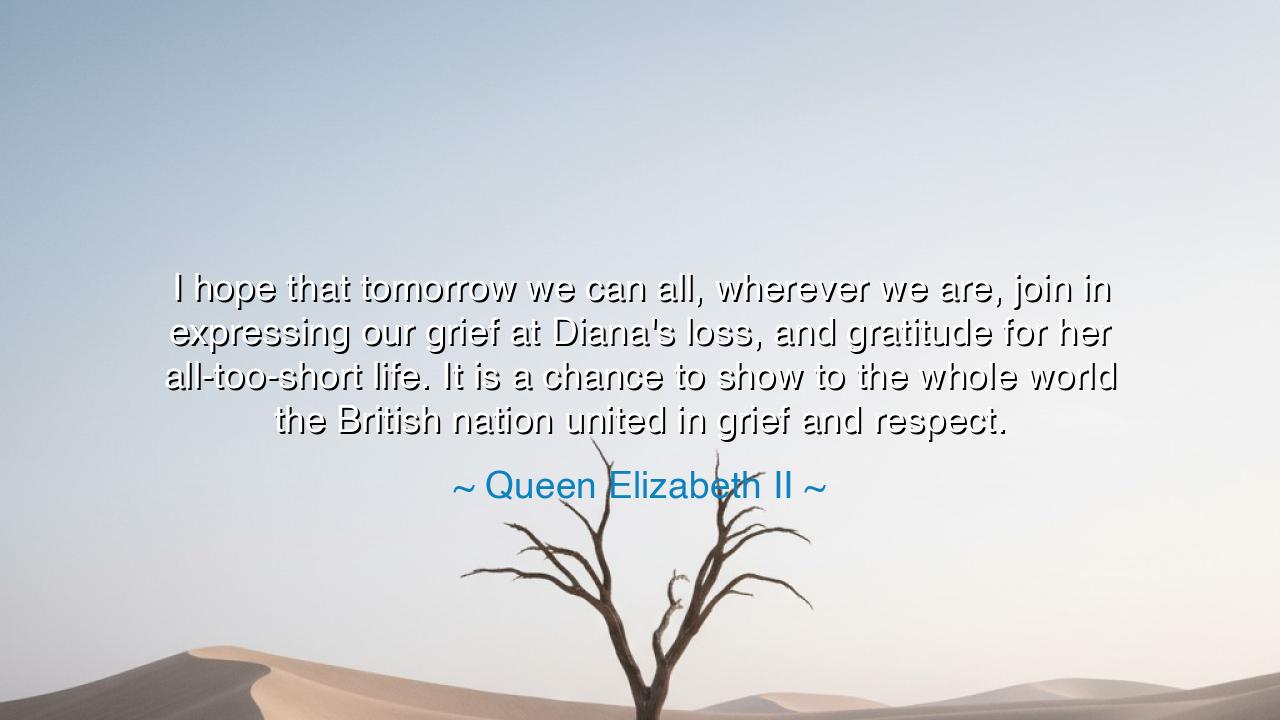
I hope that tomorrow we can all, wherever we are, join in
I hope that tomorrow we can all, wherever we are, join in expressing our grief at Diana's loss, and gratitude for her all-too-short life. It is a chance to show to the whole world the British nation united in grief and respect.






In the deep well of human sorrow, there are few moments that unite us more profoundly than the loss of a figure who has touched our hearts with grace, compassion, and a life well-lived. In her reflection on the tragic death of Princess Diana, Queen Elizabeth II speaks words that resonate with the weight of grief and respect: “I hope that tomorrow we can all, wherever we are, join in expressing our grief at Diana's loss, and gratitude for her all-too-short life. It is a chance to show to the whole world the British nation united in grief and respect.” These words remind us that in the face of loss, there is a sacred duty to mourn together, to honor the departed, and to express our collective sorrow in a way that binds us together as a people.
In times of profound tragedy, the ancients knew well that mourning was not just a private affair but a communal act. In ancient Greece, public displays of grief were integral to the culture, as seen in the rituals surrounding the death of the great heroes. The city of Athens would come together in solemn procession to honor those who had fallen in battle, for it was believed that the collective grief of the community elevated the soul of the departed, ensuring they were remembered and celebrated. Queen Elizabeth II’s words echo this ancient understanding: when we mourn together, we not only honor the life of the departed but strengthen the bonds that hold us together as a society.
Diana’s loss was not just the loss of a beloved princess, but the loss of a symbol of compassion and change. The British nation, in mourning her passing, sought not only to honor her as an individual but to celebrate the values she stood for—charity, humanitarianism, and the ability to inspire others. The world, too, felt this loss deeply, for Diana was a figure whose reach extended far beyond the British Isles. She had given voice to the marginalized, brought attention to the suffering of the poor, and championed the causes of the most vulnerable. Her life, though short, was a testament to the power of kindness and the ability of one individual to make a significant difference in the lives of others. In this, the grief felt by the British nation, and by the world, was not merely for the passing of a person, but for the loss of the potential she held yet to be realized.
In the same vein, when the mighty Alexander the Great passed away, his empire was shaken, and his people mourned. Yet, it was not just his military conquests that were celebrated, but the vision he had for a world united, a world where cultures met and shared in mutual respect. Alexander’s death marked not only the loss of a conqueror but the end of a dream that had united people across vast distances. Similarly, Princess Diana’s untimely passing left a void in the world stage, for she was a beacon of humanity and grace, bridging the worlds of royalty and the common people, of the wealthy and the impoverished, with a heart open to all.
Queen Elizabeth’s words, though spoken at a time of personal and national grief, also point to a deeper truth—the power of grief to unite. In the moments following the loss of a great leader, the nation’s grief becomes a shared experience, a collective acknowledgment of the fragility of life. Just as the ancients would gather to mourn the passing of kings and heroes, so too must we, in the modern world, embrace the opportunity to come together in shared sorrow. Unity in grief is a powerful force, for it allows us to honor not just the individual we’ve lost, but the collective spirit of humanity that binds us all.
In our own lives, we must remember the value of communal mourning. In times of personal loss, we often retreat into isolation, consumed by the weight of our emotions. Yet, Queen Elizabeth II’s reminder calls us to embrace each other in grief, to share the burden of sorrow with those around us. By doing so, we not only honor the life of the departed but strengthen the bonds of community. We must not shy away from expressing our gratitude for the lives of those who have shaped us, for it is in the acknowledgment of their contributions that we give meaning to their time on earth.
The lesson here is both simple and profound: in the face of grief, do not withdraw, but rather gather together. Let us honor those we have lost, not with silence or withdrawal, but with united expression of sorrow, gratitude, and respect. In doing so, we offer not just tribute to the departed, but a powerful testimony to the strength of our collective spirit. Whether in national mourning or personal loss, we find our greatest healing not in isolation, but in the shared experience of grief and respect for the lives that touched ours. Let us then, like the ancient people who stood in unity, remember that in mourning together, we find our path forward, not just through sorrow, but toward a future shaped by love and unity.






AAdministratorAdministrator
Welcome, honored guests. Please leave a comment, we will respond soon